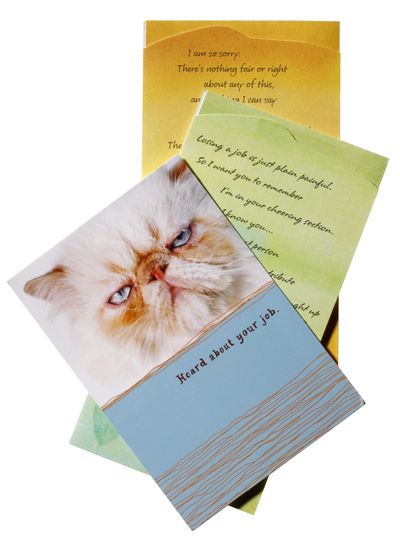Jobless cards can say it all
Hallmark’s latest line targets touchy times

DALLAS – Greeting card companies have taken a cue from the nation’s 9 percent unemployment rate.
In a 6-by-4 inch envelope, someone can send a friend who lost his or her job a preprinted message of encouragement and sympathy.
Though not available at every corner store, layoff greeting cards are being manufactured by Hallmark and sold at its stores and online – and selling well, said Frank Fernandez, owner of two Hallmark stores in North Texas.
“We’re in the emotional business,” said Fernandez. “You want to say something emotionally correct and give them (your friends) a card that you’ve chosen to express your own thoughts.”
One Hallmark card with a photo of a cat reads: “Is there anywhere I could hack up a hairball, like say, on a former employer’s head?” Another card says: “Losing a job is just plain painful. So I want you to remember I’m in your cheering section … ”
Online companies such as Zazzle and Greeting Card Universe have also begun selling layoff cards. The second-largest greeting card company, Ohio-based American Greetings, has not produced greeting cards with specific captions about job loss. Spokesman Frank Cirillo said consumers can write their own messages to make the cards more personal.
David Smason, 25, moved to Dallas from New Orleans and was laid off from his last job in the hospitality industry. While standing in line at a downtown job fair earlier this month, he said he was unsure if getting a layoff card would have been all that encouraging for him.
“I do think it’s thoughtful,” he said. “But I think you have to have a healthy sense of humor to appreciate that kind of thing.”
Stanford University professor Bob Sutton said layoff cards might be a good way to show compassion to someone who needs support during a tough time.
“Treating them as if they are invisible is often the worst thing,” said Sutton, who has written several books on management and the workplace. “It is a very small thing, but may matter to some people.”
Still, he said, not everyone would appreciate it, especially those who consider losing one’s job a private or embarrassing issue.
That’s the reason pre-printed cards are sold, said Emily West, a communications professor at the University of Massachusetts who has studied the greeting card culture. Hallmark and similar companies are taking some of the difficulty out of sending concern and support to a friend who might have lost his or her job, she said.
“The production of the cards can help legitimize a sentiment,” West said. “It can be comforting. It says that it’s OK to send a card or to have this sentiment or say these things.”
Hallmark, based in Kansas City, Mo., has always adapted its cards to the current events, and it has taken into consideration the economy since 1910, said spokeswoman Jaci Twidwell.
Hallmark produces six kinds of layoff sympathy cards. The company would not disclose sales figures, but the manager of a Dallas store said such sympathy and encouragement cards sell out quickly.
In the past, some Hallmark cards have dealt with difficult issues – such as the military draft in the 1960s, nuclear warfare and the Great Depression. Cards have also offered sentimental greetings to members of the military during the 1940s and to those who suffered loss after Sept. 11, 2001.
Addressing the current economy is another way for Hallmark to take a cultural snapshot of people’s concerns. “We know these job-loss captions are not going to be the strongest performer,” Twidwell said. “But they are meant to meet a relevant and niche consumer need for many who are looking for it.”
“Cultural critics might say, ‘Oh, that’s too bad that people can’t come up with their own words,’ ” said West, the communications professor. “There wasn’t a golden age where people could come up with their own words.”
West found that people who send cards during tough times prefer to buy preprinted messages instead of writing their own. Often, the time spent trying to find the right card is just as important as finding a way to express the right sentiment, she said.
“I think,” she said, “people recognize that the right words are magical.”